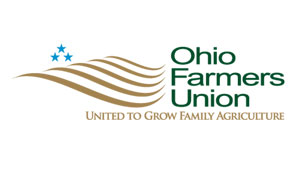 Adopted by delegates to the 81st Annual Ohio Farmers Union Convention
Adopted by delegates to the 81st Annual Ohio Farmers Union Convention
You’ll find below a link to our 2015 Special Orders of Business. Each year at the OFU Annual Convention, delegates debate a range of public policy topics they believe need attention from state or federal officials. Many of these are officially adopted as ‘special orders of business’ for OFU to pursue as an organization throughout the rest of the year. This year’s slate of special orders covers topics from taxes to money in politics to the water quality issue in the western basin of Lake Erie.
Click Here for 2015 OFU Special Orders of Business
Read the news release:
Ohio Farmers Union Outlines State, Federal Policy Priorities for 2015
Lake Erie, Pipelines, Taxes and Trade Among Concerns
COLUMBUS – Meeting in Columbus over the past weekend, Ohio’s second-largest general farm organization adopted twelve state and federal agricultural policy priorities for 2015.
Joe Logan, president of the Ohio Farmers Union, said delegates to OFU’s 81st Annual Convention focused primarily on two issues – water quality in the western basin of Lake Erie and farm real estate (CAUV) taxes.
“Most Ohioans don’t realize that many farmers’ real estate taxes on their farmland have spiked 100, 200 – even up to 300 percent in the past few years,” Logan said.
“Ohio’s program for establishing the tax value of farmland was a major issue for delegates and we approved a policy proposal that we believe would alleviate the shocking increases in tax rates farmers have experienced,” Logan said. “Farmers are being asked to shoulder an unfairly large portion of the total tax burden,” Logan added.
“This is an alarming trend that has been picking up steam in recent years.”
On Lake Erie, Logan said that the “overwhelming majority” of farmers are good stewards of the land and water. Many have adopted conservation, technological and nutrient management best practices to alleviate agricultural run-off into Lake Erie.
“The science tells us that agriculture remains a significant source of the phosphorous feeding harmful algal blooms in the lake. It appears that the legislature is choosing a more regulatory approach to nutrient management. We believe any regulations should be targeted toward those watersheds where problems are known to exist and should deal with all sources of nutrient overloads,” Logan said.
The twelve policy statements, or “special orders of business” for OFU may be found online.
They include statements on:
- Water Quality in Ohio
- Syngenta GMO Corn Litigation
- Current U.S. Trade Policy Concerns
- Private Property Rights and Private Sector-Owned Pipelines
- Farm Real Estate Taxes – CAUV
- Maintaining Guaranteed Landline Telephone Service
- Community Right to Know
- Seed Saving and Genetic Diversity
- A Move to Amend the U.S. Constitution
- Severance Taxes on Oil and Gas in Ohio
- Change Laws Regarding the Commodity Checkoffs
- Funding Claims Under the “Predator Law” in Ohio


Leave a Reply